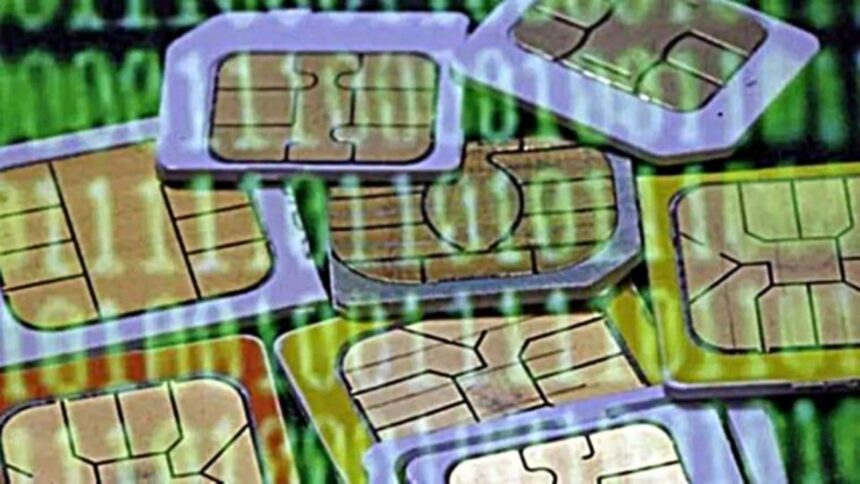Following a probe, the Central Bureau of Investigation (CBI) has registered an FIR against 39 point of sale (PoS) agents based in various states for allegedly issuing 1,100 ghost SIM cards.
The investigation, conducted after analysing complaints made by victims on the National Crime Reporting Portal, revealed that there are around 1,930 point of sale (PoS) agents from whom SIM cards were purchased, and they have sold around 64,223 mobile numbers on forged documents or those that were misused in cybercrime in Southeast Asian countries.
Among the 1,930 PoS agents, many have been arrested by the concerned state police, and the agency has now booked 39 PoS agents based in West Bengal, Uttar Pradesh, Assam, and Maharashtra.
In the FIR registered on May 8, the CBI said, “Various PoS agents acting in connivance with cyber criminals/fraudsters and unknown executives of telecom service providers are facilitating them by issuing SIM cards which are subsequently used in illegal activities involving digital arrest, impersonation, fraudulent advertisement, investment fraud, UPI fraud etc.”
Nine of the agents are from Uttar Pradesh, 15 from West Bengal, seven from Assam, four from Maharashtra, and one each from Bihar, Telangana, , and Karnataka. “During verification conducted by the CBI, it was found that most of the SIM cards have failed the re-verification/e-KYC initiated by the Department of Telecommunication (DoT) subsequent to commission of fraud which shows criminal conspiracy on part of 39 PoS agents, unknown executives of Telecom Service Providers and other unknown persons,” the FIR said.
“It was also found that around 1,100 SIM cards which were issued by the 39 PoS agents were used in various cybercrimes and about 2,200 complaints were reported and registered against them,” the FIR further states.
first reported that more than 5,000 Indians were suspected to be trapped in Cambodia after being allegedly held against their will, and forced to carry out cyber frauds. According to government estimates, Indians had been duped of at least Rs 500 crore in the six months before March this year. The Centre had then set up the inter-ministerial panel to look into the issue and identify loopholes.
The panel later identified gaps in the banking, immigration, and telecom sectors. The FIR registered by the CBI is also a part of the decision by the central agency after an inter-ministerial panel highlighted the issue.
In the verification report, the CBI said that the cyber criminals are using “ghost SIM cards” – to impersonate and conceal their identity – which are mainly registered in the name of other individuals without their knowledge. “Complaints from 2024, made by victims on the National Crime Reporting Portal were analysed, and the mobile numbers reported by them were collected. The list of mobile numbers was also filtered to identify those issued by Indian telecom companies, but were roaming in Southeast Asian countries,” the report stated.
“This analysis yielded 64,223 mobile numbers falling under the risk parameters and data pertaining to the PoS agents suggests that 1,930 PoS agents across the country were engaged in the sale of such SIM cards used for the commission of various cybercrimes,” the report said.
Explaining the modus operandi, an officer said that for issuing a SIM card, e-KYC of the customer is mandatory and the same has to be done by the PoS agent. “When a customer visits the PoS agent for the purchase of a SIM card, they conduct the e-KYC of the customer. During the e-KYC, the PoS agents inform the customer that the e-KYC has failed and ask them again for e-KYC. But, the PoS agents issued a SIM card during both the e-KYC and the customer was not aware about the second ghost SIM card,” the officer said, citing the verification report.
Later on, the PoS agents sell all the ghost SIM cards to cyber criminals, which are further used for opening mule bank accounts and also for making fraudulent calls. “It is suspected that the role of executives of telecom service providers may also be found in the activation of these ghost SIM cards,” the officer said.
Prior to this, Manral had extensively reported on city-based crime stories along with that he also covered the anti-corruption branch of the Delhi government for a decade. He is known for his knack for News and a detailed understanding of stories. He also worked with Mail Today as a senior correspondent for eleven months. He has also worked with The Pioneer for two years where he was exclusively covering crime beat.
During his initial days of the career he also worked with The Statesman newspaper in the national capital, where he was entrusted with beats like crime, education, and the Delhi Jal Board. A graduate in Mass Communication, Manral is always in search of stories that impact lives.








